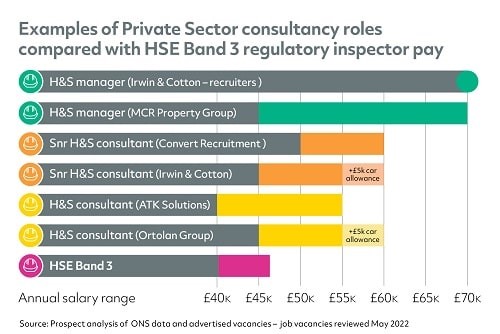Years of underfunding, overwork and underpay at Britain’s principal workplace safety regulator have created a capacity, staffing and skills crisis that threatens its ability to keep people safe at work.
Opinion
A perfect storm: why funding cuts are affecting HSE’s ability to regulate
We all benefit from health and safety at work, but it often goes unappreciated and unnoticed. As the regulator of safe workplaces, the Health and Safety Executive (HSE) is sometimes portrayed as the bogeyman – lampooned as the embodiment of “health and safety gone mad”. But the truth is that every day we spend without a workplace incident is in no small part due the vital work of HSE.
The overall perception changed for a short while during the pandemic when there was a very real appreciation that if your employer wasn’t enforcing Covid-19 compliance, then you could be in immediate danger. People wanted their workplace to be inspected and for steps to be taken if things were wrong. What soon became apparent, was that the public perception of what should be happening, in terms of workplace inspections, was in no way matched by the actual capacity of HSE to deliver.
 Mike Clancy: "Without an effective regulator, standards of health and safety at work will deteriorate."
Mike Clancy: "Without an effective regulator, standards of health and safety at work will deteriorate."
This lack of capacity has been laid bare by Prospect’s new report, HSE under pressure: a perfect storm. Using internal HSE and publicly available data, we analysed funding, the number and type of inspections and investigations, the number of inspectors and their level of experience, and how these have changed in recent years.
Funding, pay and staffing
One of the primary problems at HSE is that real terms funding has been slashed since 2010.
Since 2010, HSE has experienced cuts to its core grant-in-aid funding of around 45 per cent in cash terms – from £228 million in 2010 down to £126 million in 2019. More recently, it has risen to reach £185 million in 2022, but this is still significantly lower than 2010.
This produced staff cuts of 35 per cent across the organisation since 2010 when compared on a like-for-like basis. The number of inspectors fell by 18 per cent over the same period.
The past decade has also seen a major decline in the value of HSE salaries, with many staff having seen real-terms cuts of between 20 per cent and 25 per cent, with pay lagging significantly behind comparative roles in industry (see first chart below). This has created a recruitment and retention crisis within HSE, and also seen the relative seniority of inspectors diminish, as those with the most experience have been able to attract significantly better pay in the private sector, while recruitment is increased to bolster numbers.
With fewer senior inspectors able to train newer recruits and more junior colleagues, more experienced inspectors are having to spend ever increasing amounts of time delivering training rather than taking their expertise into workplace inspections.
 Source: Prospect analysis of ONS data and advertised vacancies – job vacancies reviewed May 2022.
Source: Prospect analysis of ONS data and advertised vacancies – job vacancies reviewed May 2022.
Impact on inspections and investigations
In combination, these challenges have led to Prospect members in HSE warning that the agency no longer has the critical mass or the right blend of experience to function adequately.
This view is clear from the data on the overall number of inspections, and the number of mandatory investigations which have had to be cancelled.
Prior to 2010, annual inspection totals reported by HSE were more than 25,000. Proactive inspections are currently being delivered at around 16,000 to 17,000 per year while HSE’s business plan for 2022/23 sets a target to complete just 14,000 – almost half the number being completed in 2010. It is likely that even these reduced targets will become increasingly difficult to achieve.
Of further concern is that the number of mandatory HSE investigations that weren’t carried out because of resourcing issues increased nearly 200-fold between 2016/17 and 2021/22. The research, using HSE’s own figures, shows that in 2016/17 there were just two mandatory investigations cancelled because of insufficient resources; in 2021/22 the figure was 389.
Conclusion
This is just an overview of what is an increasingly untenable situation for HSE, which is described fully in Prospect’s report. More than a decade of government cuts and external events have created the perfect storm for the country’s principal health and safety regulator. If the degree of pressure HSE is under is not alleviated soon, HSE will be unable to sustain its reputation as a respected, expert regulator and its very existence may come under threat.
Prospect has continually campaigned and lobbied to ensure funding levels and models are appropriate, but government has failed to heed our warnings and we have reached crisis point.
Britain’s health and safety community must join us in our campaign to save HSE, safeguard its independence and ensure it is able to keep workers safe. Without an effective regulator, standards of health and safety at work will deteriorate and our ability to deliver justice for victims of workplace accidents will be unacceptably diminished.
HSE under pressure: a perfect storm, can be found at:
library.prospect.org.uk/download/2023/00486
Prospect trade union represents more than 155,000 members who work as scientists, engineers, tech experts and in other specialist roles across the public and private sectors. For more information see: prospect.org.uk
Mike Clancy is General Secretary of Prospect trade union
OPINION

Is workplace health safe in 2026?
By Kevin Bampton, BOHS on 10 February 2026
UK Government efforts to boost the economy and employment levels through approaches such as deregulation pose a serious threat to the country’s workplace safety standards and the health of our workforce.

How stress and burnout will shape the workplace in 2026
By Charlotte Maxwell-Davies, Mental Health UK on 09 February 2026
Burnout is rapidly becoming one of the nation’s most significant workplace challenges. It is emerging as a defining issue for organisations and wider society, as the UK contends with a long-term sickness crisis driven by poor mental health. Stress can be motivating in short bursts, but when left unmanaged it contributes to work absences and lost productivity, as well as presenting a clear risk to the health of workers.

A new year, a new approach to risk?
By Mike Robinson FCA, British Safety Council on 02 February 2026
The rulebook is becoming obsolete faster than we can rewrite it. While bureaucracies labour to update yesterday’s regulations, the world of work transforms daily.



